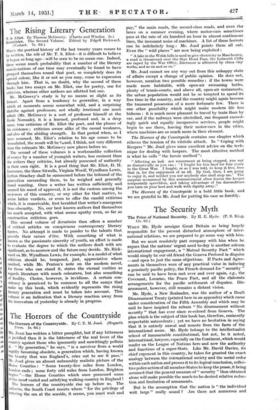The Horrors of the Countryside
The Horrors of the Countryside. By C. E. M. Joad. (Hogarth Press. ls. Cid.) MR. JOAD has written a bitter pamphlet, but if any bitterness is justified then it is the bitterness of the real lover of the Country against those who ignorantly and unwittingly pollute it. " My generation," he says, " is a survivor from a world rapidly becoming obsolete, a generation which, having known the beauty that was England's, cries out to see it pass." Mr. Joad gives an almost unbearably realistic picture of the Rome Counties : " Some twenty-five miles from London, London ends ; some forty odd miles from London, Brighton begins "—the Home Counties which once possessed some of the most varied and satisfying walking country in England 1 The horrors of the 'countryside rise up before us. The suburbs, the South Coast resorts where " for the privilege of uttering the sea at the seaside, it seems, you _must wait and
pay," the main roads, the second-class roads, and even the lanes on a summer evening, where motor-cars sometimes pass at the rate of six hundred an hour in almost continuous lines, the incessant noise of machines. A list of these horrors can be indefinitely long : Mr. Joad points them all out.
Even the " wild places " are now being exploited :
" A lake in the Welsh hills is used to give electricity to Manchester, a road is threatened over the Stye Head Pass, the Lulworth Cliffs are raped by the War Office, Dartmoor is affronted by china clay works, and so on and so on."
Mr. Joad cannot see any way out from this unhappy state of affairs except a chaage of -public opinion. He does not,
however, mention two possible remedies : if the towns were made more habitable, with open-air swimming baths, plenty of tennis-courts, and above ail, open-air restaurants, the urban population would not be so tempted to spend its free time in the country, and the country might again become the treasured possession of a more fortunate few. There is one other possibility which might make modem life less hideous : it is much more pleasant to travel by train than by car, and if the railways were electrified, ran frequent exceed- ingly quick and equally inexpensive services, people might
begin to use them, leaving their motor-cars in the cities, where machines are so much more in their element.
The Horrors of the Countryside contains one chapter which relieves the tension of its vitriolic attack. In " Coping with Keepers " Mr. Joad gives some excellent advice on the tech-
nique for dealing with keepers. The most effective method is what he calls " the heroic method":
" Affecting an indi ant resentment at being stopped, you say as dramatically as you can : I fought for this land for four years in the Great War. I fought, or so I was told, to keep it free, free that is, for the enjoyment of us all. By God, then, I am going to enjoy it, and neither you nor anybody else shall stop me.' The surprise occasioned by this announcement often leaves the keeper temporarily speechless, and taking advantage of his discomfiture you turn on your heel and walk with dignity away."
The Horrors of the Countryside is a bold little book, and we are grateful to Mr. Joad for putting his case so forcibly.























































 Previous page
Previous page